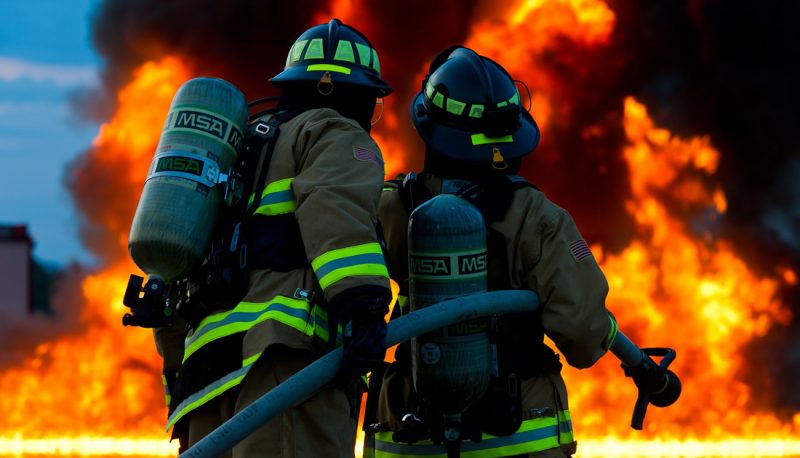“Confirmed Judges, Confirmed Fears” is a blog series documenting the harmful impact of President Trump’s judges on Americans’ rights and liberties. Cases in the series can be found by issue and by judge at this link
Trump Second Circuit Judge Richard Sullivan, joined by Trump judge Joseph Bianco and a judge nominated by President George W Bush, reversed a district court decision that ruled that the New York City Fire Department (FDNY) discriminated against four black firefighters by insisting on rigorous enforcement of a “no beards” policy, even though the firefighters have a disability that limits shaving and the FDNY had previously provided them with an accommodation that it refused to reinstate. The June 2021 decision was in Bey v City of New York.
Salik Bey, Terrel Joseph, Steven Seymour, and Clyde Phillips (“the firefighters”) are Black men who have been firefighters in New York since prior to 2015. All four suffer from a skin condition known as PFB, which occurs more frequently among Black men and results in “persistent irritation and pain,” and sometimes scarring ,when they shave “down to the skin.” Beginning in 2015, the FDNY offered an accommodation to full-duty firefighters suffering from PFB under which they could maintain “closely cropped beards” of up to one-quarter inch, as long as they could also pass a “fit test” designed by OSHA to ensure that they could wear respirators, which are needed by firefighters, without air leakage. The four firefighters, as well as 16 others, were able to retain short beards and remain on full duty because of the accommodation without any problems.
In 2018, however, FDNY revoked the accommodation, claiming that it was prohibited by long-standing OSHA regulations. All firefighters had to either become clean shaven and shave to the skin or be placed on “light duty” and no longer fight fires. The four firefighters filed suit, claiming that the FDNY’s strict enforcement of its no beards policy without any accommodation violated both the Americans with Disabilities Act (ADA) and Title VII of the 1964 Civil Rights Act.
The case was assigned to Judge Jack Weinstein, a well-known jurist with more than 50 years of experience. After extensive discovery and other pre-trial procedures, he ruled on summary judgment that although FDNY did not violate Title VII, it did improperly discriminate against the firefighters under the ADA. There was no question that the firefighters had a disability that should be accommodated under the ADA; the primary issue was whether the FDNY was justified in revoking the accommodation because of its claim that it was prohibited by OSHA regulations. FDNY maintained that their view was supported by the “plain reading” of OSHA’s Respiratory Protection Standard (RPS), which was adopted in 1998 and states that respirators cannot be worn by employees with facial hair that “comes between” the face and sealing surface or otherwise “interferes with the face-to-faceplate seal or valve function.” Judge Weinstein disagreed, especially in light of “OSHA’s own interpretation of RPS, as contained in a 2016 interpretative letter. That letter specifically stated that “[f]acial hair is allowed as long as it does not protrude under the respirator seal, or extend far enough to interfere with the valve’s function.” According to Judge Weinstein, the evidence was clear that the letter “is OSHA’s interpretation,” that “no heightened safety risk” was caused by the accommodation, and that the decision to “abandon” it was “not based on any actual safety risks” or a change in OSHA rules but on “bureaucracy.” Accordingly, he concluded, the firefighters were “entitled to summary judgment on the disability discrimination claim.”
On appeal, however, Trump Judge Sullivan, joined by Trump Judge Bianco and Judge Reena Raggi, reversed Judge Weinstein’s decision for the firefighters on their ADA claim, even as they affirmed the decision dismissing their Title VII claim. Without explaining specifically what was wrong with Weinstein’s view below, Sullivan maintained that the OSHA RPS “regulation text” in fact “makes clear” that individuals cannot have any facial hair whatsoever “where the respirator seals against the mask-wearer’s face.” Sullivan also maintained that despite the language quoted above, the 2016 letter “does not suggest that short beards are permitted” because the examples of facial hair it specifically says are permissible, like mustaches or goatees, “end before a respirator’s sealing points,” even though the letter says nothing about the examples being exclusive. And although Sullivan acknowledged that FDNY had previously interpreted the OSHA regulations as permitting very short beards, and he could point to nothing in the record suggesting any safety reason not to again make the accommodation, he simply dismissed FDNY’s prior accommodation and implementation of the RPS regulations as “not deserving of any particular deference.”
This ruling by Trump judges Sullivan and Bianco harms not only the four Black firefighters who brought the case. It also damages other Black firefighters in New York like the 16 who had used the previous accommodation, and sets a troubling precedent with respect to people’s rights under the ADA and the interpretation of OSHA rules. There are several vacancies now on the Second Circuit, including one for which President Biden has submitted a nomination that is pending in the Senate. To help counter the harmful views of Trump judges, it is crucial to our fight for our courts that the President and the Senate promptly fill all these vacancies with fair-minded judges who will respect and appreciate the rights of all.

